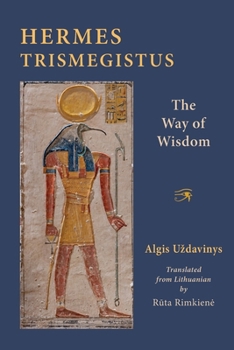Hermes Trismegistus: The Way of Wisdom
In a cosmological sense, Thoth-Hermes is equivalent to Logos, the "Word" that formed the
universe. His name is associated with the spiritual path that leads to perfection and divine
integrity or, more precisely, to various methods of philosophical purification, alchemical
transformation and theurgical ascent, which were varyingly adapted by most Mediterranean and
Middle Eastern cultic and philosophical communities, especially at the time of syncretic
Hellenism.
The figure of Hermes is an irreplaceable key to the intellectual development of modern culture.
Often associated with the Egyptian Thoth, his wisdom, amalgamating philosophy, magic,
astrology, alchemy and theology, was right at the foundations of the European Renaissance.
This book reveals the attributes of Hermes and of Hermetic philosophy and practice. By
discussing their origins and their historical spread, and by analysing the worldview and religious
iconography of the ancient Egyptians, the transformations of Hellenic culture, and various
aspects of theurgy and magic, the author shows how the tradition of Hermes Trismegistus'
wisdom, which is both multifarious and homogeneous, can be genetically traced back to the
sacred teachings of Ancient Egypt.
Reading this book with attention means in turn 1-coming face to face, 2-walking side by side, or
3-sheltering under the wing of an intellectual giant and a profoundly contemplative mind. Along
the way, as we read, three moments are discernible: first is the awareness that there is no end
of things to know-that is, marvelling at scientia, episteme, the endlessness of creation.
Second, there is the clear understanding that there is a restricted number of things we really
need to know-that "one thing needful". Finally, as the Hermetic learning is accomplished, there
is the realisation that there is no end of things to know-the infinity of being. And under the
student's eyes the cosmic forms now unfold in stellated patterns, now merge towards an ever-
receding and ever-desirable crystallisation, the ultimate Love of philosophers. These three
moments naturally reflect the essence of this book, because Hermes is the divine mediator
between the sciences of created beings and the gnosis of uncreated realities-and this is not
just a book about Hermes but also a Hermetic book.





